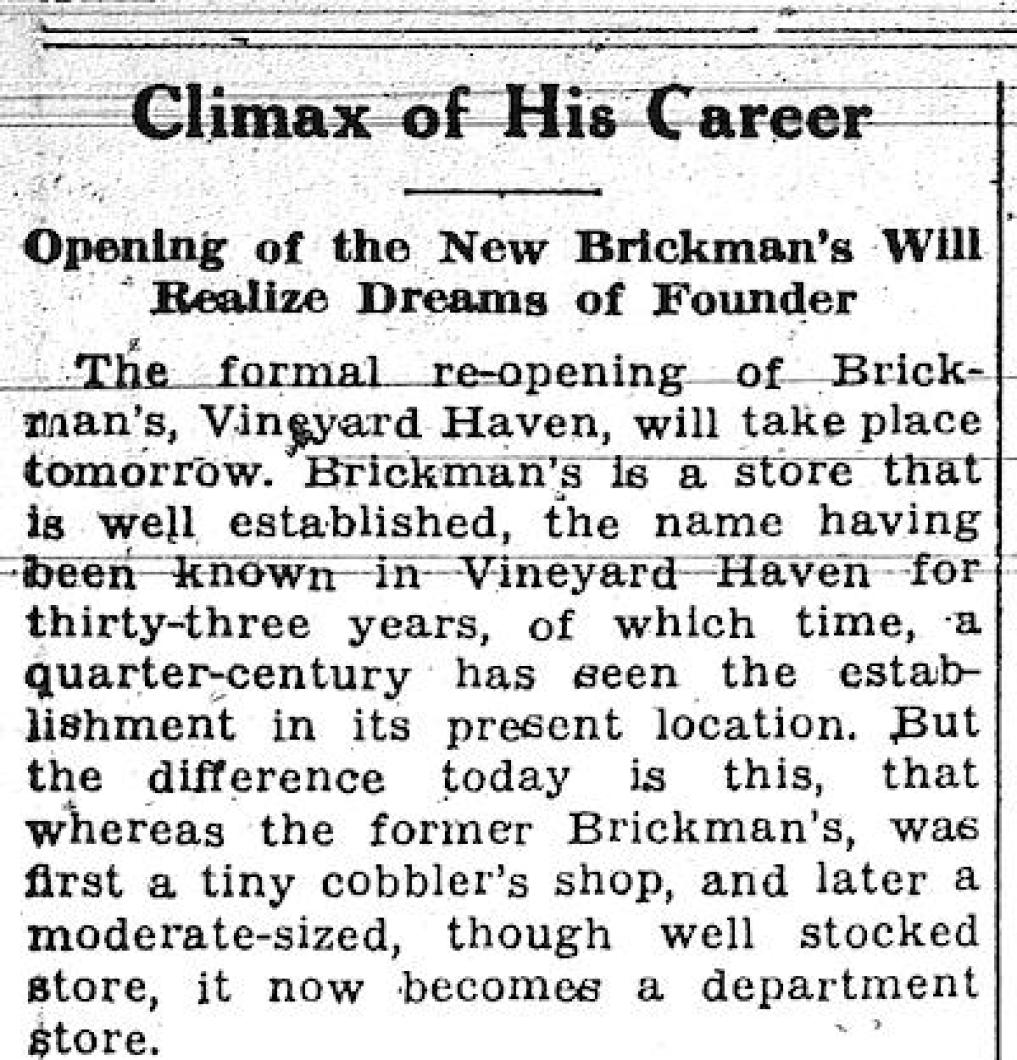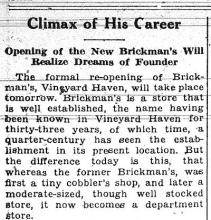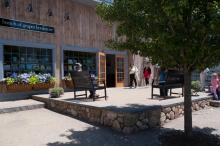The formal re-opening of Brickman’s, Vineyard Haven, will take place tomorrow. Brickman’s is a store that is well established, the name having been known in Vineyard Haven for thirty-three years, of which time, a quarter-century has seen the establishment in its present location. But the difference today is this, that whereas the former Brickman’s was first a tiny cobbler’s shop, and later a moderate-sized, though well stocked store, it now becomes a department store.
Remodeling and expansion, carried out under the most trying conditions, have more than doubled the size of the former store. The addition of departments on the second floor, make still further increases, and the visitor returning to Vineyard Haven will be struck by the change.
The first floor, except only for the stairway and two dressing rooms, is all one huge room, 125 feet in length and thirty feet wide. The floor is of inlaid linoleum tile, the walls of sea-green with counters, cases and trim of natural maple. Shelving, and recessed compartments for the display of merchandise, and over all is a white, sound-proof ceiling for which hang the fluorescent lighting fixtures.
Alcove with Curved Wall
The shoe department, which is in the rear of the store, is constructed in alcove style, with a curve wall, lined with shoe-boxes. In this alcove are movable chairs of stainless steel frame, with cream and red leather upholstering.
The tailor shop, which is a part of the establishment, shoe repairing department, around which the business was originally built, the offices and stock-rooms, are all on the second floor, which allows the greatest possible expansion for the store proper.
A proud man is Judal Brickman this day, as he contemplates the work of his hands and those of his family, for in the thirty-three years that have passed since he first hung out his sign on Main street, he has progressed from a cobbler, earning eight dollars a week, to the proprietor of one of the counties largest business establishment. Of this he says: “I knew may trade. I was willing to work, and my family helped me. I met my business obligations, but, somebody had to tryst me first, and this I can never forget.”
Brickman, as he is everywhere known, is a native of Lithuania, where his boyhood was anything but joyous. Apprenticed to a tailor at the age of 11, he was so small that he could not keep the thimble on his finger, and was obliged to give up the work to become a shoe-maker. Not a cobbler, or shoe-repairer, be it noted, but one who took the materials, measured the foot and made complete, the shoe or boot desired. For three years he worked without drawing any wages, his hours, 5 in the morning until 11 at night, except on Friday and Saturday nights, when he worked the night through. He then went into a city shop to complete his training, there drawing $40 for his first year’s work, and $80 for the second.
The Decisive Incident
Even so, perhaps he would have been happy in his native land, under a less exacting government, although the threat of compulsory military service under another race was distasteful. But on one occasion, workers on strike, proceeding in a body to an assembly where they were to be addressed by the mayor of the city, and soldiers fired upon them, killing eighteen in the street.
Brickman was determined to leave the country, and this he did, after much hardship, and the loss of nearly every cent he had, which was demanded by racketeers, as payment for not turning him over to the authorities. For a time he lived in Denmark, and has the greatest fondness for that country, but America beckoned, and in 1911, he landed in New York, with very little money, a wife and two small children, but confident that he could make his way if he could but find the opportunity to demonstrate his skill at his craft. It was very shortly thereafter that he came to the Vineyard to enter the employ of a local cobbler at eight dollars a week. His employer wanted to sell the business, and Brickman purchased it. The first step in his planned course was achieved. He was in America, the proprietor of his own business!
The people of Vineyard Haven can tell the rest of the story. How the light in Brickman’s little shop was burning when they retired at night, and when they arose in the morning he was already at work. There was no other way to progress. With a few dollars which he set aside for the purpose, he bought a few pairs of new shoes, and selling them, he increased his next order slightly. Thus in time he became a shoe dealer, and moved into a larger store, but he still worked at his bench, day and night. As his children grew, they entered the business, bringing new ideas and ambitions. Thus a line of clothing was added to the shoe business, sporting goods, and other items, yet Brickman’s was and still is fundamentally a store for men and boys, although handling shoes for everyone.
And now, from the wreckage of many a venture, caused by the late war, arises the new Brickman’s, larger, finer, and more impressive. It would not be truthful to say that it is better, with respect to quality or service. “I hope,” says he, “to provide my town with a store as good as any between here and Boston. I have endeavored to carry the stock and give the service which would make it so. Now we can display it better, give people more room in which to move about, and present a more attractive picture to the public. But the merchandise; it was the best we could get, even before this.
“Nowhere save in America could such a thing have happened,” says Brickman, who will not continue to work with his lasts and awls as he has done in the past. An operator has taken over the shoe-maker’s shop, and Judal Brickman, the founder, has merited opportunity to look upon the work of his hands, to admire it and greet his friends, with leisure to talk during working hours, for the first time in a lifetime devoted to labor.










Comments